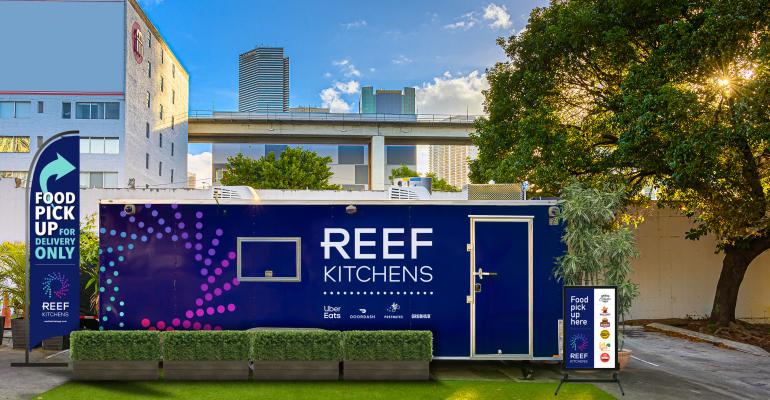Following reports last fall and winter that ghost kitchen disruptor Reef Technology had temporarily halted operations in multiple cities due to permitting issues, Reef is now working with city authorities to update food vendor regulations, starting with the technology company’s hometown of Miami.
Reef began working with the Miami mayor and city commissioners last year to craft a framework policy that would create guidance for the previously unregulated “mobile operating units” (i.e. Reef’s podular units that fall somewhere between a food truck and a restaurant). On March 24, the city of Miami just renewed the regulations framework for a final year, which will need to be reassessed after the pilot’s second year ends.
“When this was passed, it was definitely first of its kind legislation that has been specifically designed to regulate mobile food businesses, and ghost kitchens specifically,” Mason Harrison, spokesperson for Reef Technology told Nation’s Restaurant News. “It’s the only kind of framework that exists for our model.”
The Reef Technology model of placing mobile units in parking garages and vacant lots has allowed Reef to grow rapidly but also led to permitting and health regulations issues, as initially reported by Insider. In fall 2021, Reef temporarily suspended operations in New York City, Detroit, Houston and Philadelphia.
In New York City, the company had been operating its kitchens — for which there is currently no health permit type in New York City — under temporary food truck permits while in the process of obtaining long-term health permits for its modular kitchens. There had also been reports of food safety violations in Reef’s small mobile units, including reports of raw chicken and frozen water pumps in the winter, which required some Reef vessel operators to use water bottles to operate safely and adequately.
Reef believes that having official regulations to follow on a city-by-city basis will make it much easier for the mobile units to operate without issue in the future.
The first pilot program of the “app-based meal production program” in Miami ended on March 10 and was renewed a couple of weeks later. The regulations require the podular units to refrain from providing on-site takeout or dine-in service, obtain city permits, and provide information about the number of participating sites and employees to the city, including total number of code violations.
The city of Miami also “showed interest” in reducing the amount of waste from these facilities, and according to Reef, biodegradable packing is now used in 90% of Reef facilities in Miami. According to Harrison, in the year since Miami adapted this pilot program, other cities have followed suit, including Orlando, which has created its own version of the program based on Miami’s, and Dallas, which is set to vote on new mobile food regulations soon, like free vending sites for mobile food units that operate on a first-come, first-serve basis, according to Dallas Magazine.
“This Miami pilot set off a chain of events and now a lot of other cities are moving in this direction,” Harrison said. “It’s a great program for Miami to show other cities how they can adopt to a changing modern economy.”
Contact Joanna at [email protected]
Find her on Twitter: @JoannaFantozzi





